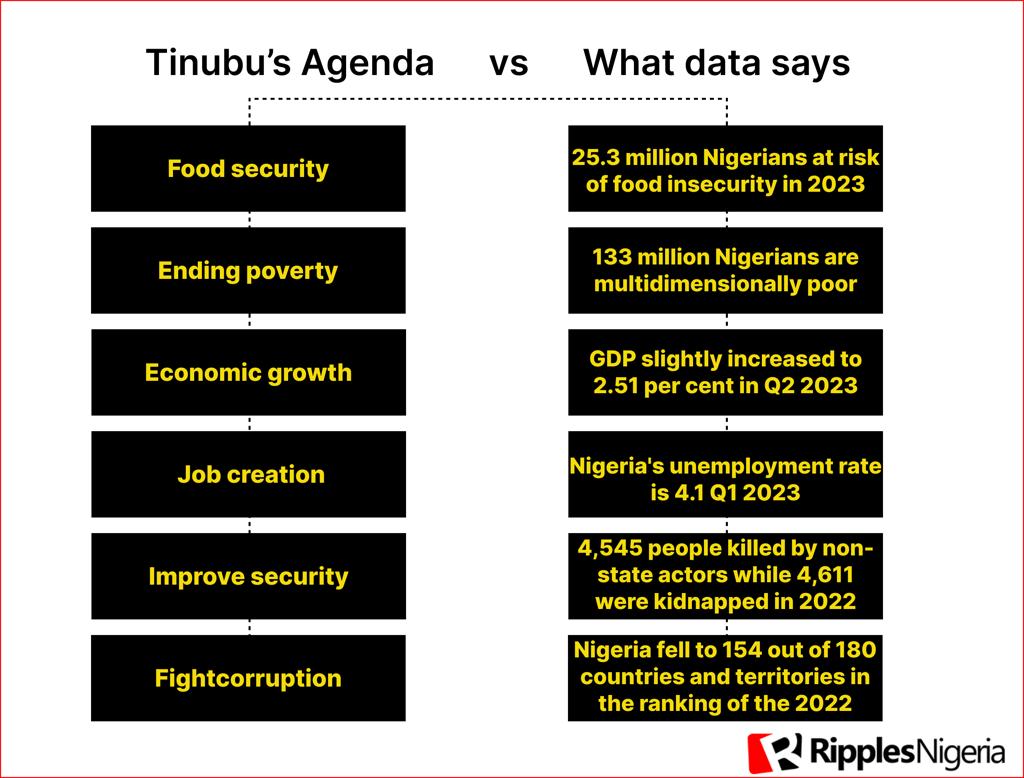Ripples Metrics
RipplesMetrics… 100 DAYS: Highlighting the data across Tinubu’s 8-point agenda

At the maiden meeting of the Federal Executive Council, Nigeria’s President, Bola Ahmed Tinubu, unveiled an eight-point agenda to turn the country’s economy around with an implementation target of three years.
According to the Minister of Finance and Coordinating Minister for the Economy, Wale Edun, the agenda includes food security; ending poverty; economic growth and job creation; access to capital; improving security; improving the playing field on which people and particularly companies operate; rule of law; and fighting corruption.
Edun said, “It is around those matrixes that the plans and the targets of what will be delivered in the next three years or so were identified, discussed and imputes were given by various ministers and we’ll now go away with the marching order to refine further the targets in particular and within weeks to start rolling out policies and programmes to turn around the economy and make things better for all Nigerians. That really is the substance of what the discussions were all about.”
This agenda is coming months after the president enacted two policies that have crippled the economy, according to available data. For instance, the removal of fuel subsidies increased the pump price of fuel by over 200 per cent. Also, the unification around the exchange rate market also increased the Naira to the dollar from N460/1$ to over N900/1$.
For this report, RippleMetrics compiled the recent data around these agendas using available data provided by the country’s data bureau and other secondary data sources.
Food, Poverty, Economy and Jobs
On food insecurity, the 11th edition of the Global Food Security Index (GFSI) published in 2022 showed that the country ranked 107th out of 113th countries globally with a score point of 42.0. By implication, 12.9 per cent of the global population in extreme food crises is found in Nigeria.
This corroborates the consistent increase in the inflation rate across food products in the country. Nigeria’s inflation rate is currently 24.08 per cent, the highest in more than a decade. Also, the Food and Agriculture Organization projected that 25.3 million Nigerians would face acute food insecurity during the lean season.
Similarly, on poverty, the National Bureau of Statistics published, last year, that 133 million Nigerians are multidimensionally poor. By breakdown, 105.98 million people are poor in the rural area while 26.94 million poor people in the urban area
The report also captured that the NorthWest region had the highest poor Nigerians with Sokoto state having the highest share.
READ ALSO:RipplesMetrics: Analysing July 2023 inflation rate increase
The president also highlighted in his agenda the plans to grow the economy. In his inaugural address, Tinibu noted that he plans to increase the Gross Domestic Product of the country by six per cent annually and by 13 per cent in three years. However, recent data from NBS showed that, as of the second quarter of 2023, GDP slightly increased to 2.51 per cent from 2.31 per cent. This is the slowest growth in two years.
On job creation, NBS’s recent report showed that Nigeria’s unemployment rate dropped from 33.3 per cent in 2020 to 4.1 in the first quarter of 2023. However, the report, when released, became controversial as the bureau had adopted a new methodology for its survey. KPMG, a multinational professional services network, predicts the unemployment rate at 41. per cent.
Security, Rule of Law, Corruption
Nigeria currently faces several insecurity challenges around banditry, kidnapping, inter-ethnic or communal crises, separatist agitation and insurgency in the northern region.
For instance, under the 8-year administration of the former president, a total of 63,111 persons were killed due to insecurity challenges according to data from the Nigeria Security Tracker. Also, an analysis by a report said that 4,545 people were killed by non-state actors while 4,611 people were kidnapped in 2022.
On corruption, Nigeria fell four places from 154 out of 180 countries and territories in the ranking of the 2022 Corruption Perceptions Index released by Transparency International. Although the country maintained its previous score of 24 out of 100 points in 2022, it fell to 150.
Meanwhile, the rule of law index, which captures perceptions of the extent to which agents have confidence in and abide by the rule of the society, scored Nigeria -0.86 points in 2021, a drop from 0.83 in 2020.
Tinubu also plans to increase access to capital and improve the playing field on which people, particularly companies, operate.
However, the Coordinating Minister of Health and Social Welfare, Ali Pate, said that critical sections of the health value chain would be exploited to improve the economy and create jobs for Nigerians adding that the president was responsive to the need to set the economy on the path of progress with his move to remove subsidy on petrol from the first day on his inauguration.
By James Odunayo
Join the conversation
Support Ripples Nigeria, hold up solutions journalism
Balanced, fearless journalism driven by data comes at huge financial costs.
As a media platform, we hold leadership accountable and will not trade the right to press freedom and free speech for a piece of cake.
If you like what we do, and are ready to uphold solutions journalism, kindly donate to the Ripples Nigeria cause.
Your support would help to ensure that citizens and institutions continue to have free access to credible and reliable information for societal development.






















